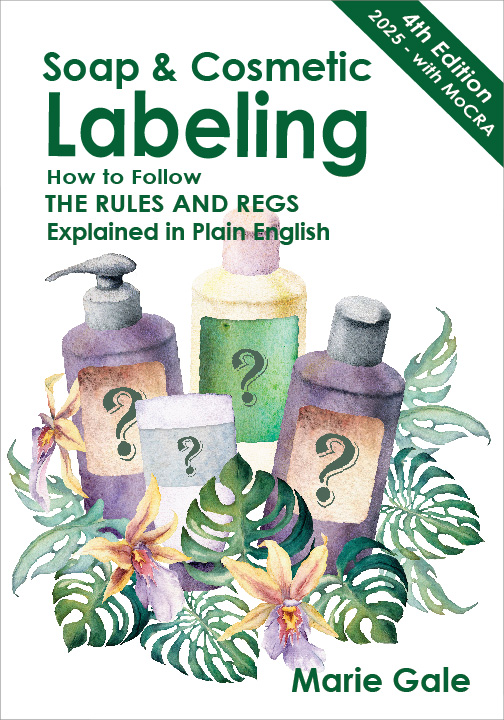As handcrafters, often working out of our homes, it’s always been an issue that the street address is required on our product labels (unless published in a current phone or city directory). The Handcrafted Soap and Cosmetic Guild (HSCG) just announced that the petition they filed with the FDA in 2012 to allow the use of a PO Box in lieu of a street address, has received a final response from the FDA.
The FDA denied the HSCG’s PO Box petition, but it did provide some clarification that a “current phone or city directory” includes ONLINE directories as well as printed directories. This is VERY GOOD NEWS!
A Little History
The regulations have long been in place that the name and address of the manufacturer (or distributor) are required on the label of any consumer product, including cosmetics. The Fair Packaging and Labeling Act, signed into law in 1966, said:
Directly from the regulations:
The commodity shall bear a label specifying the identity of the commodity and the name and place of business of the manufacturer, packer, or distributor.
15 USC 1453(a)(1)
The FPLA gave the authority to make regulations to the FDA for food, cosmetics, and drugs, and to the Federal Trade Commission for other consumer commodities. I guess right at the beginning they realized that the street address might be problematic, because both the FDA and FTC gave an “out” in their regulations.
The FDA’s regulations for cosmetics say:
Directly from the regulations:
The statement of the place of business shall include the street address, city, State, and ZIP Code; however, the street address may be omitted if it is shown in a current city directory or telephone directory.
21 CFR 701.12(d)
and the FTC’s regulations for other consumer commodities say:
Directly from the regulations:
The statement of the place of business shall include the street address, city, State, and Zip Code; however, the street address may be omitted if it is shown in a current city directory or telephone directory.
15 CFR 500.5(c)
They must have been working together and coordinating the regulations, because (as you can see) the wording is IDENTICAL.
The FPLA has a preemption clause which says that the states can’t make different or less stringent labeling laws. At the state level, the Uniform Packaging and Labeling Regulation, which has been accepted in some form by most states, says:
Directly from the regulations:
The address shall include street address, city, state (or country if outside the United States), and ZIP Code (or the mailing code, if any, used in countries other than the United States); however, the street address may be omitted if this is shown in a current city directory or telephone directory.
Section 5
Again, the wording is almost identical. So, whether you are talking about cosmetics or soap that is exempt from cosmetic regulations, or whether you are talking about federal or state laws/regulations, the outcome is the same: the street address is required UNLESS it is shown in a current city or telephone directory.
About the Petition and the Response
The HSCG sent a petition to the FDA in 2012 reqesting that the regulations be updated to include the acceptance of a PO Box in lieu of a street address. A number of reasons were given as to why this was needed and a good idea, one of which was the fact that it is a problem to get listed in a “current city directory or phone directory.” Printed city directories are no longer published, and printed telephone directories are only published annually, and in some areas will no longer automatically include your business.
While not mentioned in the petition itself, there had been several incidents where a handcrafted soapmaker had been cited (at at STATE level, not by the FDA) for not having their street address on the label when the business phone wasn’t listed in a PRINT phone directory. In all the references to “phone directory” and “city directory,” they have been interpreted to mean a “print” version. There weren’t online versions of such things. There wasn’t even an “online” back when the regulations were written!
The difficulty with getting a listing in a current print directory, along with the safety issues of having a home address out there on every product label, formed the basis of the petition. The FDA’s 6-page response goes through every single point of the petition and responds with the FDA’s view based on the Acts passed by congress which are law, the existing regulations, and one Supreme Court Case.
In explaining why they disagree that getting a listing in a “current phone directory or city directory” is problematic, the FDA’s letter states:
Telephone directories are published both in print and online, and a listing in either would satisy the option under 21 CFR 701.12(d) to list a street address in a current city directory or telephone directory if the street address is not included on the product label.
From the FDA’s Letter:
Telephone directories are published both in print and online, and a listing in either would satisy the option under 21 CFR 701.12(d) to list a street address in a current city directory or telephone directory if the street address is not included on the product label.
ONLINE Directories Acceptable!
This is awesome! It’s easy, fast and immediate to get a listing in an online telephone directory. It’s low-cost or free. With an online directory as an acceptable option, anyone can fulfill the requirements to omit the street address from actual product labels.
The FDA even gave some examples of suitable telephone directories in a footnote in the letter. The HSCG blog posts gives pricing and information, which I’m copying here:
- www.localpages.com (powered by Yext.com – currently $16/month for entry level)
- www.yellowbook.com (powered by hibu.com – charges vary)
The FDA didn’t say what specific criteria needs to be met in order to qualify as a “current telephone directory or city directory,” but this list gives a good starting place.
Questions and Answers
I’m answering here a few of the questions I have already been asked (or have seen asked online). And, as a disclaimer, note that I am not a lawyer and am giving the best information I can here based on the documents to hand. As always, you should consult an attorney for actual legal advice.
What about soap, exempt from the FDA defintion of a cosmetic?
The letter was from the FDA and discussed their interpretation of the Fair Packaging and Labeling Act and the FDA regulations (21 CRF 701.12(d)a) which are applicable to cosmetics. Soap that is exempt from the FDA definition of a cosmetic is covered by the FTC regulations implementing the FPLA (15 CFR 500.5(c)); not discussed in the letter.
However, the regulations have the exact same wording and come from the exact same US Code (the FPLA). One would hope that the FDA’s lawyers and executives discussed their interpretation of the regulatons to allow online listings with the FTC, but who knows? It’s the government, after all.
If nothing else, it’s a good place to start. If you followed the FDA interpretation for cosmetic-exempt soap, it seems to me that you’d have decent grounds to argue the case if you were to be cited.
Does this apply to state regulations?
Again, state regulations are not addressed by the FDA’s letter (and they have no authority to do so, anyway). But, the state regulations are essentially the same as the federal labeling regulations and the intent is that when you meet the federal labeling requirements, you meet the state regulations.
So, if you follow the FDA guidelines and use an online listing to fulfill the requirements to omit the street address, and you get cited because you’re not listed in a PRINT directory, you probably have decent grounds to argue the point.
What about other online listing services?
The FDA’s letter was not specific about what (exactly) constitutes an online “current phone or city directory.” Of the examples they gave, all clearly mention getting listed in “white pages,” or “yellow pages,” which seems to make it clear that we’re still talking about an online version of what you’d traditionally consider a “phone book.”
Although several of the services the FDA listed also mention “business listings,” there is no real direct comparison with traditional “city directories” (which listed by address as well as business name).
If you choose to go with a different online listing service (other than the ones the FDA suggested), just be sure that it seems to meet the requirements of listing in “white pages” or “yellow pages” (to match the traditional phone books) or that it is clearly some sort of “city directory.”
(Update from 2024: Many online directories such as the Yahoo Directory have gone out of existence and been replaced by Google My Business, where it is easy and free to get a listing for your business.)
Does the street address have to be included in the online directory?
The regulations say “the street address may be omitted if it is shown …” so, yes, the street address needs to be included in the online listing.

Shameless plug!
To really be able to create your own labels that comply with the regulations, get my book from Amazon and use it.
4th Edition – Released March 5, 2025!!!
Or order directly from me (and get a signed copy)!


Leave a Reply